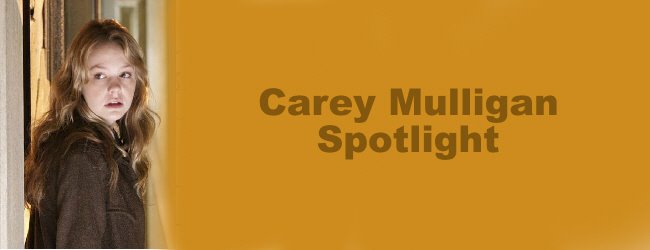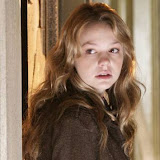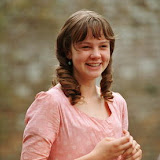Sorry for taking over 10 months to update this page but here is all the news relating the Carey over this time
Wednesday, 13 February 2008
CAREY MULLIGAN ON MY BOY JACK
Carey Mulligan, the up and coming young actress who made such an impression in the BBC's lavish adaptation of Bleak House recently appeared in the ITV drama My Boy Jack alongside David Haig and Daniel Radcliffe. Here she talks about appearing in the production.
Carey was attracted to the character of Elsie because she did not conform to the wallflower role often written for young women in period dramas. This was a girl, barely an adult, who was fiercely protective of her little brother and was not afraid to tell her domineering father so:
“Although Elsie is dearly loved, I think it’s obvious from what you read about the Kiplings that Jack was the main focus of the family and Elsie was there to support him. After Josie died, that was Elsie’s position in the family - to be Jack’s confidant and friend.
“She’s stuck at home and a bit bored, but she loves her little brother desperately. In some of the letters to her parents I’ve read, she writes about Jack with such affection. The one thought that was in my mind the whole time was ‘she can’t lose another sibling [after Josie]’. I just don’t think she or the family can take losing another child.
“Elsie comes across as quite feisty in the film, but you get the feeling that the arguments they have are brought on by her real passionate belief that Jack shouldn’t go to war. I don’t think their lives are usually like that because it wouldn’t be proper or right for a girl of that age to argue with her father, but it is clearly something she feels she has to fight for, and the minute she has to defend something, the feistiness comes out of her.
“I’m glad Elsie is a feisty character - there are so many wallflower roles for girls in period drama but she has real guts. She’s interested in politics. She isn’t going to change the world, but she talks about the suffragettes. She’s quite forward thinking and finds it hard to sit through the speeches Rudyard makes about the war and to support a war which has been built up to be this magical, wonderful thing. She can see straight through to the reality of it, where many people didn’t. Also Elsie is very aware of how it’s going to affect her. It’s very close to home - it’s as if she knows John isn’t going to survive.
“I loved it that Elsie was not in any way two dimensional. She was a fully rounded character and had so much spirit. I loved the family, and the script was just one of the best things I’d read. I would read it on the tube on the way to rehearsals and I couldn’t get to the end of it without crying, and crying on the tube is quite embarrassing. As I said, there are so many wallflower parts but Elsie is so special. David has written a really good ‘girl’ and he really understood her. He didn’t write someone airy-fairy - he wrote someone very strong. She was much more ‘masculine’ than other girls of the time and that was really interesting. And I’ve never had a younger brother, so that was lovely.
Carey also relished the challenge of playing ‘a real person’, a first for her. She stepped into the character’s shoes with the help of letters Elsie had written to her family back in the early 1900s.
“I have never played a non-fictional character before. I read as much as I could about the Kiplings and the story of Jack. Not a great deal is written about Elsie [compared to the others], so the letters she wrote were an important insight into who she was. It’s hard because you can only do so much reading around the real person. At the end of the day you’ve got a script to follow, and there was such a clear character coming out of the script. Having said that, it’s so helpful to have those pictures in your mind about their life. They travelled so much and had such an amazing education being brought up by Rudyard. They were special children.”
Carey was both moved and enchanted by the world of the Kipling family, listening to Rudyard’s magical stories in one scene and witnessing a shell-shocked soldier’s pain in the next.
“I love the birthday party scene where Rudyard tells an audience of children a story. The extras weren’t all that interested in what David was saying because whenever Daniel (Radcliffe) walked in, all the kids were just fighting the urge to look at him. But Kim and I were grinning like idiots because David has such an amazing story-telling voice - it was magical. I also enjoyed the scene when the witness to Jack’s death tells the family what happened. I think Martin McCann is a brilliant actor. I remember at the read through, his speech towards the end of the film had most of the production in tears.
“It felt eerie filming at Bateman’s. Sometimes you’d think ‘do they actually approve of what we are doing?’ And would they be happy with the way their story is being told?’ I remember at one point Daniel grabbed my hand and took me to the house where, in the archway, all four of them had etched their names into the stone. I almost burst into tears. David (Haig) did the same thing. He took me down to the sundial where Rudyard had written ‘it’s hotter than you think’. It’s those tiny details which made it such an odd and emotional experience. It was so beautiful, sitting in the garden. It felt like their own little world - you could just imagine them all there, hidden away from everybody else and the press who hounded them.”
As eerily realistic as filming at Bateman’s was, it was the dialogue between Jack and Elsie which transported Carey to another time entirely – a time she had tried to persuade her own brother, an officer in the Territorial Army, from serving in Iraq.
“I had the exact same arguments with my brother about going to serve in Iraq last year. He was dead set on going. I tried to argue with him, I tried to make him give me solid reasons, and he could, which drove me mad. At the end of the day you’ve got to realise if someone is going to do something regardless, you’ve just got to love and support them as much as you can.
“When I read the script I recognised many of the arguments which went on in our house, and it very much mirrored the angst we all felt. Every time I switched the television on over the six months and saw images of Iraq, my heart just stopped. The fear and the waiting, that’s what people can relate to. When I read the script, I could see exactly what David was getting at. I’d been through it myself. The poems and the writing enhanced and articulated it in a different way but the sentiment was the same.
“It’s interesting because that’s what you rarely get to see in war films - the people who are left behind. Can you imagine how they got through the day? Did they wake up and write a list of things they would try and accomplish to fill their time so they didn’t have to think about it? And to be a girl of Elsie’s age… Rudyard could go off and throw himself into the war effort but the women were just left to think a lot. Elsie is so desperate to fill her day. Was Jack being horribly maimed the best they could hope for? If they had that in their mind, then god only knows how they got through each day.”
Carey’s hope for the film is a simple one – that it makes people think about a young boy who dies for a cause.
“I hope audiences are moved by Jack’s story. I hope they remember that boy, that they think about him for a while. And hopefully it will make people think about all those we have lost in war and those who have never been found. I think it’s such an accurate portrayal of living with someone who is in the army, fighting a war.
“It’ll touch people because they will see themselves in it. The overriding thing that comes out of the film, however, is that we can only show those who go to war that we love them. I think that’s what people do in real life. You can argue and worry about them all you like but, at the end of the day, all you really have to do is love them.”
My Boy Jack was broadcast on the ITV1 Network on Sunday 11 November 2007 / 9:00pm - 11:00pm
http://theuktvguide.blogspot.com/2008/01/carey-mulligan-on-my-boy-jack.html
Carey was attracted to the character of Elsie because she did not conform to the wallflower role often written for young women in period dramas. This was a girl, barely an adult, who was fiercely protective of her little brother and was not afraid to tell her domineering father so:
“Although Elsie is dearly loved, I think it’s obvious from what you read about the Kiplings that Jack was the main focus of the family and Elsie was there to support him. After Josie died, that was Elsie’s position in the family - to be Jack’s confidant and friend.
“She’s stuck at home and a bit bored, but she loves her little brother desperately. In some of the letters to her parents I’ve read, she writes about Jack with such affection. The one thought that was in my mind the whole time was ‘she can’t lose another sibling [after Josie]’. I just don’t think she or the family can take losing another child.
“Elsie comes across as quite feisty in the film, but you get the feeling that the arguments they have are brought on by her real passionate belief that Jack shouldn’t go to war. I don’t think their lives are usually like that because it wouldn’t be proper or right for a girl of that age to argue with her father, but it is clearly something she feels she has to fight for, and the minute she has to defend something, the feistiness comes out of her.
“I’m glad Elsie is a feisty character - there are so many wallflower roles for girls in period drama but she has real guts. She’s interested in politics. She isn’t going to change the world, but she talks about the suffragettes. She’s quite forward thinking and finds it hard to sit through the speeches Rudyard makes about the war and to support a war which has been built up to be this magical, wonderful thing. She can see straight through to the reality of it, where many people didn’t. Also Elsie is very aware of how it’s going to affect her. It’s very close to home - it’s as if she knows John isn’t going to survive.
“I loved it that Elsie was not in any way two dimensional. She was a fully rounded character and had so much spirit. I loved the family, and the script was just one of the best things I’d read. I would read it on the tube on the way to rehearsals and I couldn’t get to the end of it without crying, and crying on the tube is quite embarrassing. As I said, there are so many wallflower parts but Elsie is so special. David has written a really good ‘girl’ and he really understood her. He didn’t write someone airy-fairy - he wrote someone very strong. She was much more ‘masculine’ than other girls of the time and that was really interesting. And I’ve never had a younger brother, so that was lovely.
Carey also relished the challenge of playing ‘a real person’, a first for her. She stepped into the character’s shoes with the help of letters Elsie had written to her family back in the early 1900s.
“I have never played a non-fictional character before. I read as much as I could about the Kiplings and the story of Jack. Not a great deal is written about Elsie [compared to the others], so the letters she wrote were an important insight into who she was. It’s hard because you can only do so much reading around the real person. At the end of the day you’ve got a script to follow, and there was such a clear character coming out of the script. Having said that, it’s so helpful to have those pictures in your mind about their life. They travelled so much and had such an amazing education being brought up by Rudyard. They were special children.”
Carey was both moved and enchanted by the world of the Kipling family, listening to Rudyard’s magical stories in one scene and witnessing a shell-shocked soldier’s pain in the next.
“I love the birthday party scene where Rudyard tells an audience of children a story. The extras weren’t all that interested in what David was saying because whenever Daniel (Radcliffe) walked in, all the kids were just fighting the urge to look at him. But Kim and I were grinning like idiots because David has such an amazing story-telling voice - it was magical. I also enjoyed the scene when the witness to Jack’s death tells the family what happened. I think Martin McCann is a brilliant actor. I remember at the read through, his speech towards the end of the film had most of the production in tears.
“It felt eerie filming at Bateman’s. Sometimes you’d think ‘do they actually approve of what we are doing?’ And would they be happy with the way their story is being told?’ I remember at one point Daniel grabbed my hand and took me to the house where, in the archway, all four of them had etched their names into the stone. I almost burst into tears. David (Haig) did the same thing. He took me down to the sundial where Rudyard had written ‘it’s hotter than you think’. It’s those tiny details which made it such an odd and emotional experience. It was so beautiful, sitting in the garden. It felt like their own little world - you could just imagine them all there, hidden away from everybody else and the press who hounded them.”
As eerily realistic as filming at Bateman’s was, it was the dialogue between Jack and Elsie which transported Carey to another time entirely – a time she had tried to persuade her own brother, an officer in the Territorial Army, from serving in Iraq.
“I had the exact same arguments with my brother about going to serve in Iraq last year. He was dead set on going. I tried to argue with him, I tried to make him give me solid reasons, and he could, which drove me mad. At the end of the day you’ve got to realise if someone is going to do something regardless, you’ve just got to love and support them as much as you can.
“When I read the script I recognised many of the arguments which went on in our house, and it very much mirrored the angst we all felt. Every time I switched the television on over the six months and saw images of Iraq, my heart just stopped. The fear and the waiting, that’s what people can relate to. When I read the script, I could see exactly what David was getting at. I’d been through it myself. The poems and the writing enhanced and articulated it in a different way but the sentiment was the same.
“It’s interesting because that’s what you rarely get to see in war films - the people who are left behind. Can you imagine how they got through the day? Did they wake up and write a list of things they would try and accomplish to fill their time so they didn’t have to think about it? And to be a girl of Elsie’s age… Rudyard could go off and throw himself into the war effort but the women were just left to think a lot. Elsie is so desperate to fill her day. Was Jack being horribly maimed the best they could hope for? If they had that in their mind, then god only knows how they got through each day.”
Carey’s hope for the film is a simple one – that it makes people think about a young boy who dies for a cause.
“I hope audiences are moved by Jack’s story. I hope they remember that boy, that they think about him for a while. And hopefully it will make people think about all those we have lost in war and those who have never been found. I think it’s such an accurate portrayal of living with someone who is in the army, fighting a war.
“It’ll touch people because they will see themselves in it. The overriding thing that comes out of the film, however, is that we can only show those who go to war that we love them. I think that’s what people do in real life. You can argue and worry about them all you like but, at the end of the day, all you really have to do is love them.”
My Boy Jack was broadcast on the ITV1 Network on Sunday 11 November 2007 / 9:00pm - 11:00pm
http://theuktvguide.blogspot.com/2008/01/carey-mulligan-on-my-boy-jack.html
Subscribe to:
Post Comments (Atom)



No comments:
Post a Comment